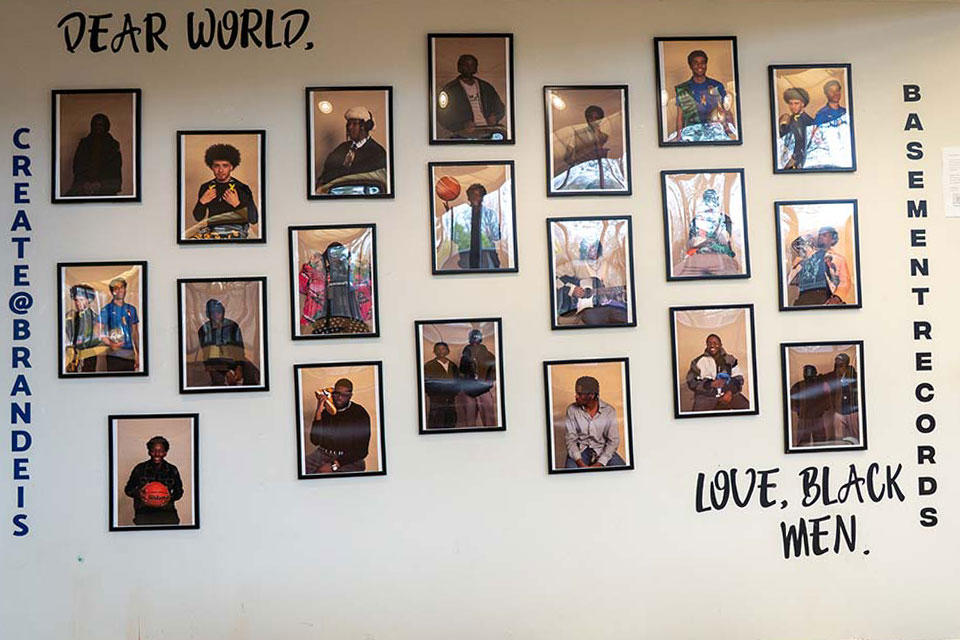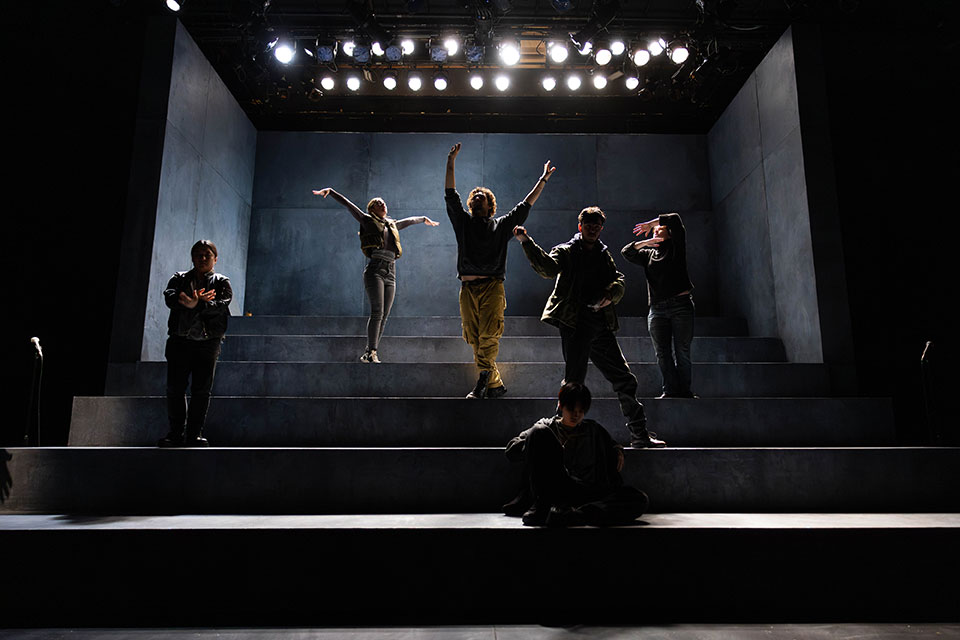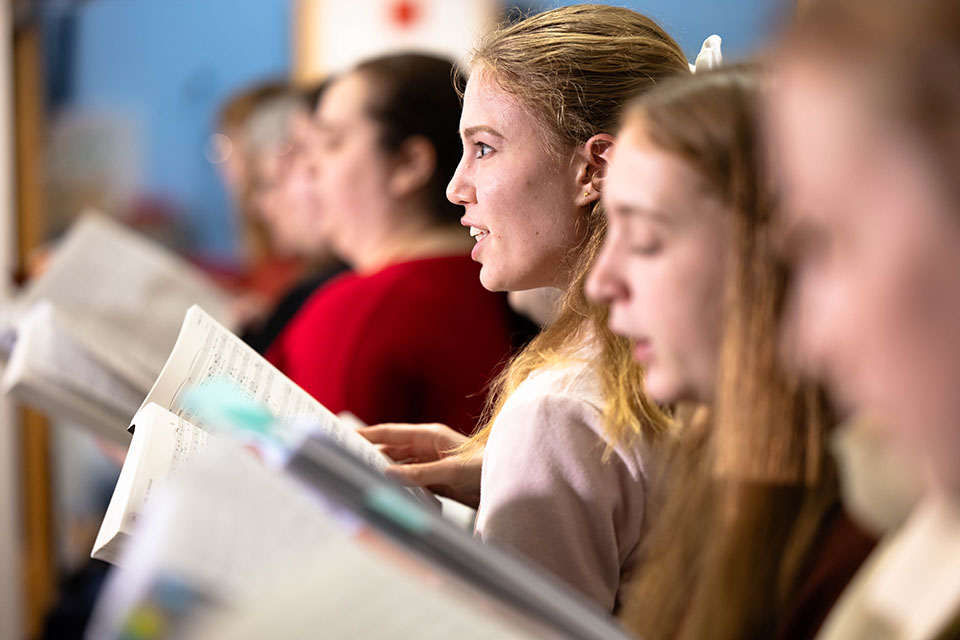Deeply Rooted: Faith in Reproductive Justice
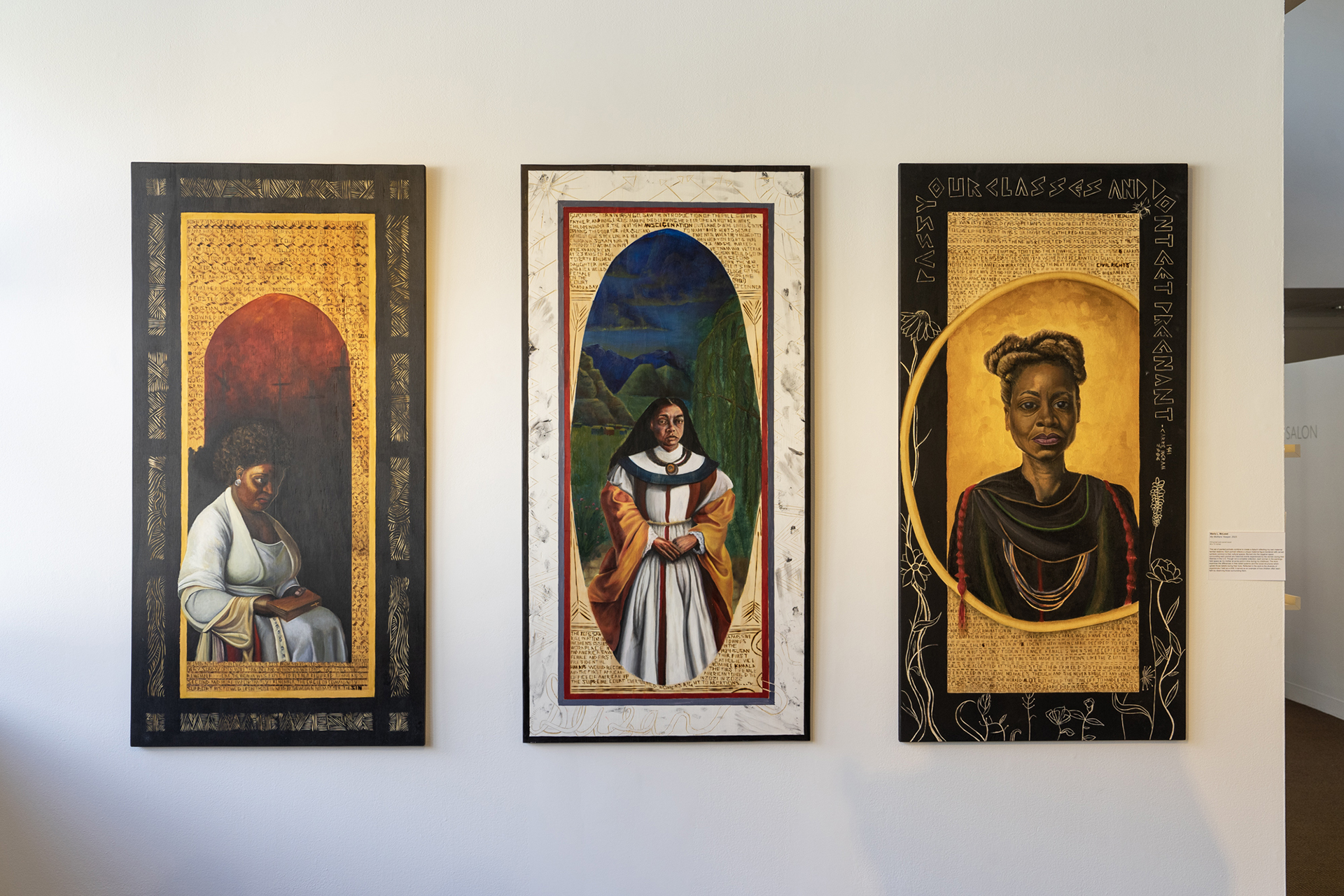
Photo Credit: Elizabeth Ellenwood
By Amy Powell
January 25, 2024
Art Exhibition
Nov. 2, 2023 - Feb. 1, 2024
Kniznick Gallery, Women’s Studies Research Center, Epstein Building
515 South St.
Brandeis University, Massachusetts
Gallery hours: Check HBI’s website
Curated by Caron Tabb
Exhibition Catalog: Contains artist statements and bios, essays on the art, and religious views (Muslim, Christian and Jewish) on abortion and reproductive justice
While faith is often used as a cudgel to create divisiveness around reproductive justice, the 21-artist multimedia exhibition in the Brandeis Kniznick Gallery, Deeply Rooted: Faith in Reproductive Justice, shows that faith can provide both a means of support and an entry into an important conversation.
Curated by Caron Tabb, a local “artivist,” and member of HBI’s Art Advisory Council, the issues raised have never been more relevant. Monday marked the 51st anniversary of Roe v. Wade. Abortion has been either banned or restricted in more than 20 states. There is a challenge to the availability of medication abortion pending before the Supreme Court. Texas overturned a ruling that provided a medical exception for Kate Cox, a Texas woman carrying a fetus diagnosed with a fatal condition that threatens her health and fertility.
At the Deeply Rooted Opening Reception, Sapna Khatri, director of the Massachusetts Attorney General’s new Reproductive Justice Unit said, “So few things are as sacred as how we make decisions about our bodies and families. We’ve seen the way religion can be used to unfairly cloud the issues. Policy and litigation can be effective, but art is a beautiful way to shine a light, to be the light. When you combine that with faith, you get something really beautiful.”
Discussion about the exhibition’s concept began when the Dobbs v. Jackson Women’s Health decision leaked to the public. In the June 2022 decision, Justice Alito wrote that the right to abortion was not “deeply rooted” in the U.S. Constitution or our nation’s history, in conflict with many religious practices, including Judaism.
“Justice Alito determined this by engaging in a selective reading of the law and a narrow set of historical materials. If he had looked more broadly, at the practices of women from across the religious, ethnic, and racial spectrum throughout American history, seeking bodily autonomy in a variety of ways under adverse conditions, he would have seen something different,” said Lisa Fishbayn Joffe, the Shulamit Reinharz director of HBI.
Through the research she conducted in curating the exhibition, Tabb found art that reflected a wide swath of religious and cultural perspectives on reproductive justice, a term coined by the Black feminist movement to include all the resources needed to give birth to and raise a healthy child. She found that artists were responding to the moment by creating work that reacted to the Dobbs decision. Others agreed to create new work for the show.
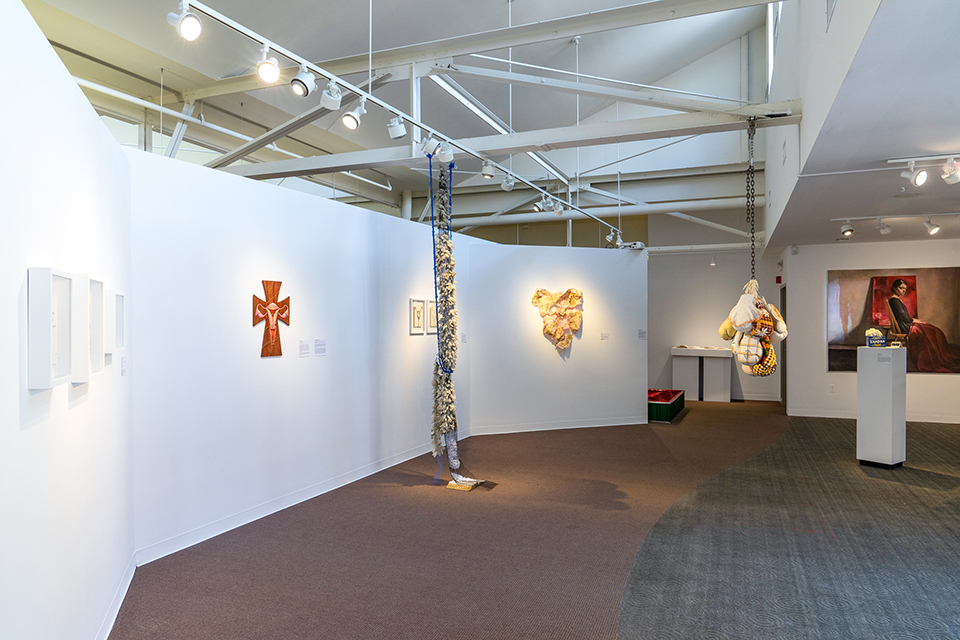
Charlie Dov Schön, the youngest artist in the exhibition, grew up with Roe’s protections. Her work, Post Roe Protection Amulets, small pillows made of felt, lace, ribbon, birth control pills and their blister packets, remind us of the amulets many Jewish women use to protect against the curse of Lilith.
Cora Ramirez-V’s work, The Cross I Bear, reimagines a crucifixion with the reproductive system nailed to the cross. At the opening reception, she spoke of venting her rage about what is being worshiped and what is being sacrificed. Lizzy Alejandro’s photograph, Siege, shows a cross between a woman’s legs, a work defined by her teen practice as a Jehovah’s Witness, where she “experienced firsthand sexist attitudes from followers of the faith … promoting misogynist behaviors.”
The Rose Art Museum loaned HBI According to Grandma, a new acquisition from the British artist Zoë Buckman. The sculptural piece that hangs from the ceiling uses boxing gloves covered in her grandmother’s domestic textiles - tea towels and doilies, to create a bond between generations of women as survivors. The piece asks us to consider the gloves as a way to both knock down or build up.
Jacqueline Nicholls, a British artist, “drew the Talmud,” using the practice of daf yomi, studying a Talmud tractate daily (it takes 7.5 years to complete) to focus on niddah, the laws of family purity. Her work focuses on the rabbis who “discussed women’s bodies, legislating their purity.” Niddah practices are also echoed in Janice Rubin’s The Mikvah Project, photographs that show ways women are taking back definitions of purity and ritual.
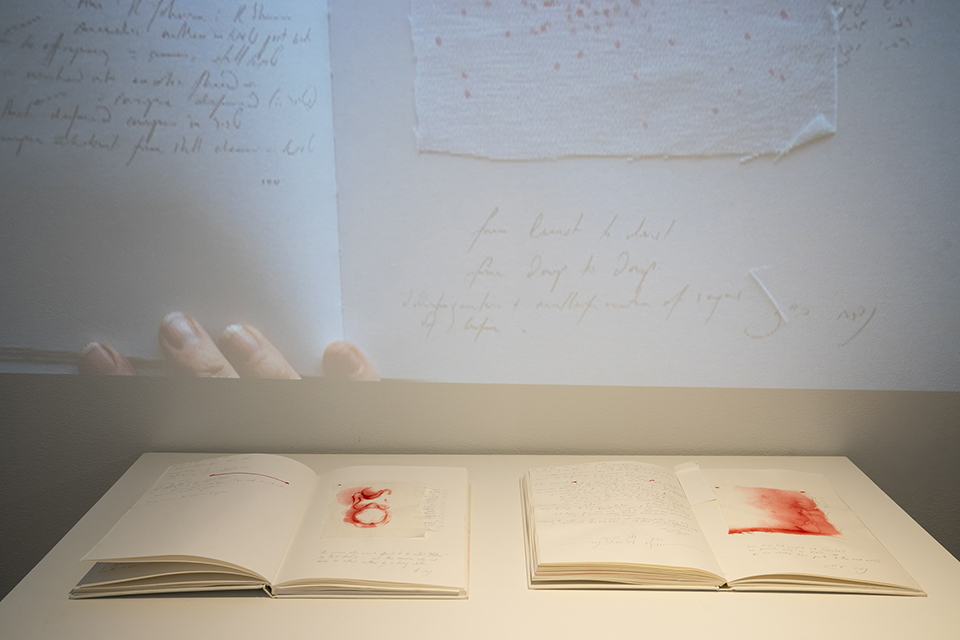
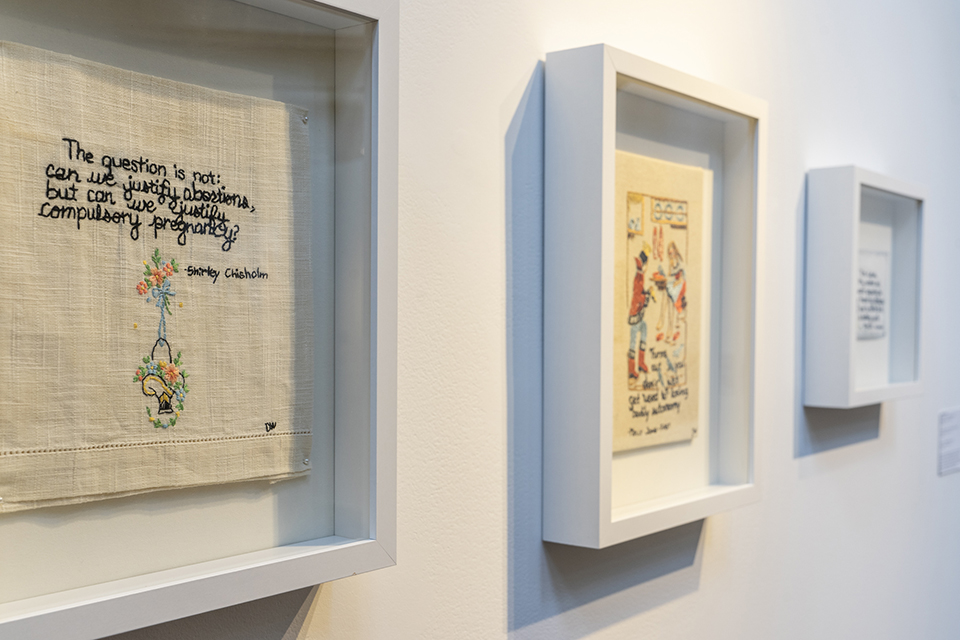
HBI created a student docent program for Deeply Rooted, enabling eight students to assist with all aspects of the exhibition including research, installation, tours, and design. Students created a resource guide for the exhibition catalog, and assisted with a feedback zone in the Sandler Salon, giving those who visit Deeply Rooted a way to get active around these issues and share their impressions. Many who visited left personal stories about relatives who died of illegal abortions, or who performed them. Others vented their rage that after so much activism in their younger days, women are once again losing their rights.
Several docents have enjoyed their interactions with the artists, the public, and the curators. “Hearing them discuss the work has been a real privilege. It is so much more of an embodied experience,” Mara Lebovitz ’24 said. “I’ve learned to synthesize information so that it is accessible to everyone, no matter their levels of knowledge on these subjects before coming to the exhibition.”
XiHu Arfa ’24 said the job was a perfect fit to merge her interests in Women’s, Gender and Sexuality Studies, Studio Art, and museum studies. “It was new to me to work with the curators and the HBI staff, and to give tours and talk about the art. It was an invaluable experience,” said Arfa, who assisted with facilitating tours, framing art, and installing wall text.
Tabb, whose artistic practice combines art and activism, said, “We often get the impression that faith is meant to restrict reproductive justice, but it is exactly the opposite. When you do your homework, faith is widely understood to be a tool for better reproductive justice.”
Deeply Rooted has also been used to open space for discussion of the war in Israel and Gaza, antisemitism, and gender based violence. These discussions are facilitated by a piece that was added to the exhibition just before it opened. Cambridge artist Winnie van der Rijn’s 2023 Tactical Survival/Prophylaxis (Uterine Armour #11-Because Hope is Not a Strategy) features a pair of bloomers fashioned with camouflage and containing tools that might be needed in both war generally and in the battle for reproductive justice. These tools of survival hang from the garment, including condoms, Plan B, sexual assault survival manual, pepper spray, drink tester kit, and more.
Liza Heck ’25, who attended the reception and returned with a Brandeis class, said “Cultivating a space for artists to have a voice to express themselves when it comes to reproductive justice issues – allows for healing, growth, and a chance for a new kind of conversation, bringing light through a faith based lens.”
